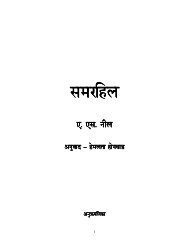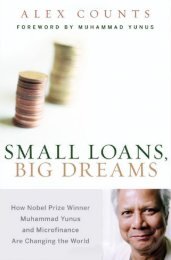Michael Ernest Sadler (1861â1943) - Vidya Online
Michael Ernest Sadler (1861â1943) - Vidya Online
Michael Ernest Sadler (1861â1943) - Vidya Online
You also want an ePaper? Increase the reach of your titles
YUMPU automatically turns print PDFs into web optimized ePapers that Google loves.
In 1930 <strong>Sadler</strong> paid his third visit to the United States. He addressed the Pennsylvania<br />
Schoolmen on ‘An Englishman’s Thoughts on the Service of American Education to the<br />
World’. He also lectured to the faculty and students of Teachers College, Columbia<br />
University, New York, on the general theme ‘The Outlook in Secondary Education’. His three<br />
lectures were entitled ‘Progress And Pitfalls’, ‘Youth and Tests’ and ‘A Liberal Education’.<br />
These three lectures taken together sum up <strong>Sadler</strong>’s experience and thinking. In the first he<br />
attempts a living portrait gallery of the many young people from different nations whom he<br />
had met. In the second, he concentrates what he has often written and spoken about with<br />
reference to examinations and assessment. In the third, A Liberal Education a historical<br />
retrospect (which ranges from Plato and Aristotle to Cardinal Newman, Matthew Arnold, T.<br />
H. Huxley and R. H. Tawney), <strong>Sadler</strong> crystallizes his own convictions in a masterly<br />
peroration. In savouring its inspiration for our own day I would substitute for the term a<br />
liberal education (which by now has drawn to itself a limited historical connotation), the<br />
phrase, a liberating education. Such a substitution would, I believe, have been acceptable to<br />
<strong>Sadler</strong> himself as he grappled with the problems of the enslaving media conditioning of young<br />
people. Ever the optimist, he concluded for his American audience with the words:<br />
But we can go forward rejoicing at what has already been achieved and with confidence that by slow degrees we<br />
shall come more nearly to the attainment of our hopes. We realize that a liberal education is a discipline of body,<br />
mind and spirit; a discipline which is not only individual, but communal. Our eyes have bee n opened to the truth<br />
that the angle of a liberal education subtends the arc of life from the nursery to old age. We perceive that the<br />
presence of a liberal education is not signified exclusively by any label, certificate or academic degree; above all<br />
that a liberal education does not consist in the absorption of inert ideas in cramming for an examination. 21<br />
Having thus cut through the undergrowth of much contemporary educational practice, <strong>Sadler</strong><br />
may well be required to give us a somewhat more positive delineation of what he wished to<br />
see as the harvest of a liberating education. His answer is unequivocal and he rounds off his<br />
peroration by focusing on an attitude of mind. The fruits of the education he visualizes will<br />
be:<br />
Evinced in an attitude of mind, liberated from apathy and from self-will, in an attitude of mind toward life, work,<br />
duty, and the realities of belief. In it are blended freedom and discipline; questioning and awe; the education of<br />
the body and the education of the mind; training and self-training; science and letters; preparation for livelihood<br />
and leisure alike. 22<br />
During his last decade as Master of University College, <strong>Sadler</strong> was much preoccupied with<br />
the menacing international situation that was developing in Europe. In 1933 he gave an<br />
address at Rhodes House in Oxford based, as he said, on my personal experience during the<br />
last nine months. He proceeded to make an analysis of the impact of Marx’s Das Kapital and<br />
Adolf Hitler’s Mein Kampf. He made a number of deductions about the interrelationships of<br />
economic and spiritual forces and suggested:<br />
Not only the European and Australian and the American, but the bronze, black and Far Eastern worlds are<br />
involved together. But because the unrest in our minds is spiritual as well as economic, the course of the<br />
revolutions will proceed at a different pace in different regions. . . . I conceive the outcome of this worldwide<br />
revolutionary movement will be the establishment not of a new social order but of new orders. . . . The hope that<br />
after a world crisis and ‘clear up’ there will emerge one universal type of social organization seems to me oversimplified.<br />
23<br />
In 1934 <strong>Sadler</strong> entertained von Ribbentrop, the German Ambassador to the United Kingdom,<br />
for a weekend at the Master’s Lodgings in University College. He was an unwelcome visitor<br />
and <strong>Sadler</strong> has left a vivid account of the exchanges that took place. After dinner, von<br />
Ribbentrop delivered a defence of National Socialism, declaring that it had saved Germany<br />
8




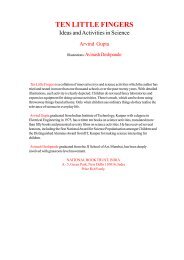
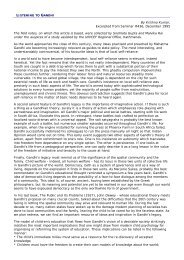
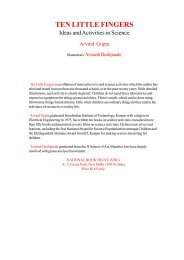



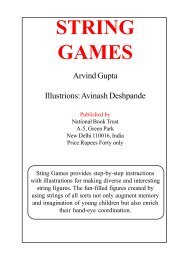

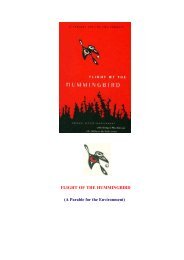
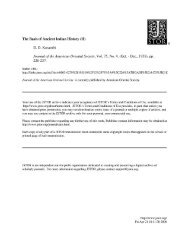
![tq,a] diM+s vkSj vk/qfud ekuo - Vidya Online](https://img.yumpu.com/31264147/1/190x245/tqa-dim-s-vksj-vk-qfud-ekuo-vidya-online.jpg?quality=85)

